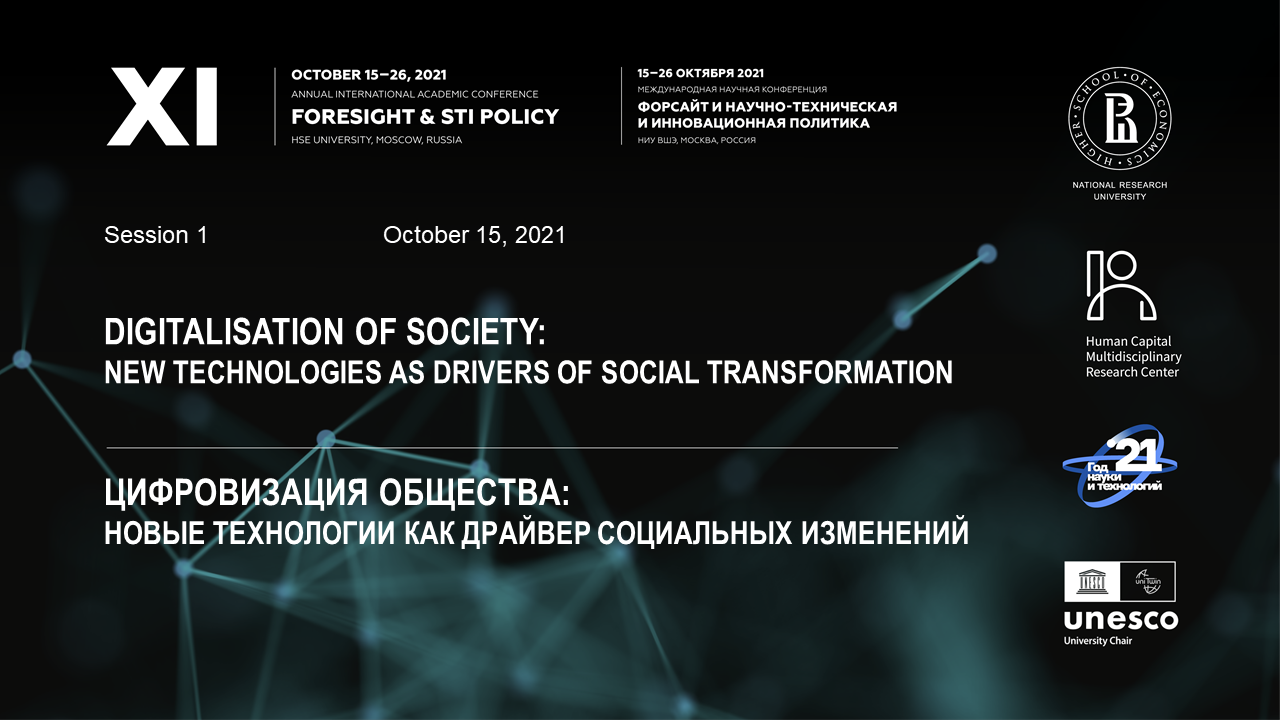Generations Communicating in Digital Environment

Gadgets have been gaining strong, and different, influence over the daily tasks of Russians: on the one hand, they reinforce our connectedness to the world during the harshest lockdown, on the other — the contact between real individuals or even generations is getting weaker. Robots help automate routine tasks, as well as learn how to make rather autonomous decisions, and yet it is unclear, who should be responsible for those decisions. The XI International Academic Conference ‘Foresight and Science, Technology and Innovation Policy’, conducted online on October 15–25, 2021, started with a comprehensive analysis studying the social effects of digitalisation.
As the Deputy Director of HSE Centre for Statistics of S&T and Innovation Ekaterina Streltsova pointed out when opening the XI Foresight Conference, for the first time in history it started with social aspects of introducing advanced technologies, and that, of course, is not coincidental: the dissemination of innovations depends on dominating settings, and they, in turn, may radically affect the values. Participants of the Session 1 ‘Digitalisation of Society: New Technologies as Drivers Social Transformation’ discussed sociological approaches to evaluating Russians’ engagement in a digital environment.
Researchers observe: in the nearest ten years, the consumers’ practices will be mainly supporting the interests of Generation Z, or zoomers,— people who were born from 1995 till 2010 and who cannot imagine their lives without gadgets. Businesses already target their demand and adjust product lines accordingly. Parents cannot always keep up with zoomers, especially grandmothers and grandfathers that often continue living in the analogue world. ‘Superfluous people’ that have not found their identity in the XXI century, usually become observers, not consumers of the digital world, said Lilia Pankratova, an Associate Professor of Culture and Communication Sociology at the St Petersburg State University. Overcoming this digital gap is the most important challenge of the fourth industrial revolution unfolding right before our eyes, or Industry 4.0, characterised by the widespread introduction of Internet and electronics, establishment of infrastructure complexes providing smart machines with working conditions and humans — with a higher quality of life and consumer comfort.
Together with benefits, digital technologies bring threats. The use of artificial intelligence, for example, may lead to identity theft or intentional data leaks. And those are not the only risks. The speaker emphasised that society will have to come to a consensus on how it is going to bear responsibility for the decisions adopted by AI. Say, who should reimburse the damage caused by an accident associated with unmanned aerial vehicles — producers or owners of devices?
The closest chance of meeting these types of ‘inhuman’ decisions will appear if autonomous transport becomes implemented on a daily basis. The most recent five-year trends in changing social constructs regarding such technologies have been described by Valentina Polyakova, Research Fellow of the HSE ISSEK Centre for Statistics and Monitoring of S&T and Innovation, in her report ‘Driverless Cars: Between Public Trust and Anxiety.’
The analysis of public opinion on this issue reveals two opposite tendencies. As such, public interest in unmanned vehicles is clearly growing: in 2015, driverless taxis could carry 23% of Russians, in 2020 — 36%. Positive perception of this technology correlates with the age of respondents: over a half of zoomers are ready to use driverless transport (aged 18–25) and less than a quarter of respondents aged 55 and over. People still perceive driverless transport as entirely autonomous. If we add an option of manual control, the trust towards driverless cars as a comfortable means of transportation increases.
The issues of integrating the elder generation into digital space and increasing digital gap were touched upon by Research Fellow of HSE ISSEK Ekaterina Taran. This topic is becoming a serious global challenge when we see how fast the technologies spread and consider a growing tendency of ageing of the population. In 2018, a share of individuals oved 65 has for the first time surpassed the share of children under 5, and by 2050, as forecasted by the UN, 16% of the global population will overcome that age mark (in 2019 — 9%).
In Russia, many third-age people have little to none engagement in a digital environment. For example, among Russians who never used the Internet, almost 88,7% are over 55 years of age. About a third part of representatives of this age group does not consider it important. Among reasons which prevent them from learning how to use the computer and related technologies, the elderly name lack of funds for receiving access, out-of-date equipment (often ‘inherited’ from younger relatives), lack of skills (or their absence is evident in 90% of Russians aged 75 and over).
The elderly people with a high level of resilience are more integrated into digital space. And vice versa, the inclusion into digital environment enhances this characteristic, emphasised the speaker, by referencing the 2021 study results from International Science and Education Technology Laboratory for Enhancing the Quality of Life with the Elderly under the Tomsk Polytechnic University.
Due to the introduction of lockdown measures, in particular, self-isolation, many routine practices of Russians of all generations were transferred online. Some of them remained there afterwards, as was demonstrated by Ivan Yudin and Liliya Kuzina from HSE ISSEK Laboratory for Economics of Innovation in their report ‘Digital Practices of Russian Population in the Post-Pandemic Period: a Rebound Effect?’ Researchers compared the results of two 2020 and 2021 HSE ISSEK public opinion studies on the demand for digital technologies and their influence on routine practices, norms, and values during the pandemic, using the same sample (3,000 Internet users) and a set of questions about 20 practices used both online and offline.
Self-isolation had the strongest effect on online sales and purchases habits. During the first year of the pandemic, Russians received financial, insurance and public services online, learnt how to use the tools for remote work and entertainment. The share of those who performed those practices online has remained practically the same by 2021, as compared to 2020, which means that those practices are still used digitally, noticed the researchers. In the post-pandemic period Russians started to use even more complicated financial tools, including investment tools (the share of respondents who indicated their demand for this type of online activity in 2021 grew by 13 points).
Nevertheless, this year some practices started to return to the real world, as some lockdown measures have been lifted: people started to meet online more rarely, learn, watch sport and cultural events, as well as do online shopping.
Last year traditional labour and office work markets had to accustom themselves for the first time to work in the remote mode, a hurdle that long ago has been overcome by freelancers: namely, how to search for a work-life balance, arrange a comfortable workplace out of the office, communicate with colleagues and evaluate efficiency of employees. The pandemic has not caused any radical changes in the freelance market, it keeps evolving under trends that have formed before. The researchers from the HSE Laboratory for Studies in Economic Sociology (LSES) Denis Strebkov and Andrey Shevchuk have come to that conclusion from observing the market from 2009 to 2019. They presented their results in a joint presentation ‘Remote Work in Russia: Trends and Perspectives of the Market.’
According to LSES experts’ estimations, freelance work is not as popular in Russia, as it is in the developed countries, and is still perceived as an innovative employment model. At the same time, more and more Russians consider it a viable option for themselves. Now, they may even transfer from flexible employment as side work towards transferring to remote format as the main income source. The personnel distribution of the freelance market is approaching the employment distribution in the economy, the gender balance evens out: 42% of females in 2019 against 33% in 2009. There is a prominent ageing trend: the average age of providers ten years ago — 27 years, now — 33–34 years.
There is another trend related to that — growth of education level: 2/3 of freelancers have higher education. This market is decentralising by way of increasing the share of providers from regions (70% in 2019 г. against 59% in 2009) and decreasing the share of Moscovites (19% in 2019 against 31% in 2009), and is also becoming more diversified from the point of specialisation: save for IT and design, the amount of offers grows in marketing and advertising, business consulting and word processing. Despite state efforts (self-employment format, tax exemption), the legalisation of the freelance market is progressing slowly: over half of providers rely on informal agreements, contracts are signed by 15%.
Video recording of the session ‘Digitalisation of Society: New Technologies as Drivers of Social Transformation’
(with Russian simultaneous translation)

